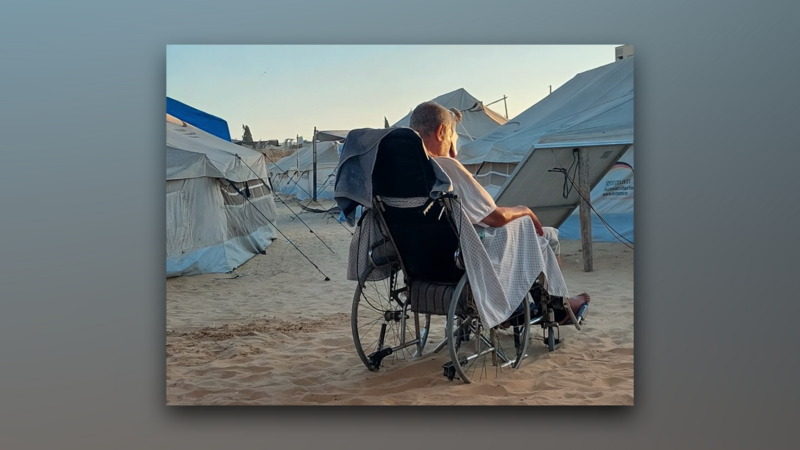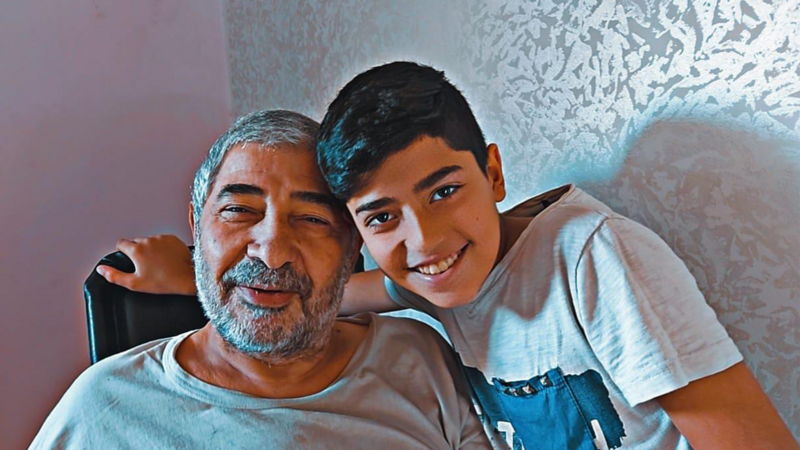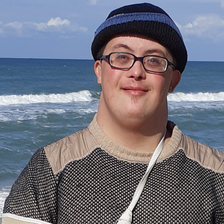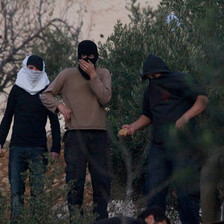The Electronic Intifada 10 September 2024

Ali Abu al-Fahm, 58, was killed when an Israeli Apache helicopter fired on him, in his wheelchair, during an attack on their camp in Mawasi al-Qarara.
On 24 July, Ali Abu al-Fahm was about to go to sleep in his tent when quadcopter drones began randomly firing nearby. Soon, all he could hear were screams and bullets flying.
Ali is 58 and mostly paralyzed from the waist down. He told his wife Rania to “escape” and get out of the area of fire.
“Leave me,” Rania later recalled him saying. “I will be a burden on you if you push my wheelchair. Run away and stay alive.”
“I won’t leave you alone,” she told him.
Ali and Rania, along with their daughter Shams, 22, and son Zaman, 12, and their three younger children, fled the area, pulling Ali in his wheelchair through the sand of Qizan Abu Rashwan – a piece of land between Khan Younis and Rafah in southern Gaza that is now crowded with tents.
Around them they saw others in the camp fleeing in horror with their children. They smelled the suffocating pesticide-like scent of white phosphorus munitions that makes your lungs burn.
Rania and Ali learned that a man in the next tent had been killed by the quadcopter bullets. He had been shot in the stomach and his family could only watch as he took his last breaths. They could not take his body with them as they fled the camp.
Rania and Ali and their children made their way to Nasser hospital, some 5 kilometers away, as hospitals are generally considered to be “safe” in Gaza. They would later piece together that the attack had been a means for the Israeli army to clear the way to raid the Qizan Abu Rashwan area.
The family spent the night at the hospital, and when daylight came, they fled to Mawasi al-Qarara, another so-called safe area, according to Israel, located in northwestern Khan Younis.
After 5 kilometers, they finally found a car to take them the rest of the way, but they reached Mawasi al-Qarara empty-handed. They had nothing with them, no tent or even extra clothes. They would have to start again from scratch.
“More than 20 bullets hit our tent”
Nearly a month later, on 21 August, the Abu al-Fahm family would experience another raid by Israeli troops.
This time, the Israelis raided Mawasi al-Qarara with tanks as well as quadcopters and helicopters. The Abu al-Fahm family tent was in the Lisan al-Mina area, on al-Tina Street, and this seemed to them to be at the center of the raid.
Quadcopter drones spread out and started shooting at the tents around 6 pm. Apache helicopters also fired bullets at the displaced people in their tents.

L to R: Ali Abu al-Fahm and his son Zaman, 12, have been repeatedly displaced by Israeli attacks.
“More than 20 bullets hit our tent,” Shams said. “All our plates, utensils and clothes were pierced.”
Everyone was running around madly in the street, trying to save their lives and escape the bullets.
The Abu al-Fahm family was also terrified and started running to try and find shelter.
Rania escaped with the three youngest children and Shams and Zaman pushed their father in his wheelchair. A large trailer was moving quickly through the area, and it ran over Ali’s feet and crushed them beneath the weight of the tires. The driver had stopped – since the road was full of people running – leaving Ali’s feet trapped.
Ali’s paralysis is such that he still has limited feeling in his lower limbs though he cannot move them, and he screamed out in pain.
Since the road was packed with people, Shams could not get the driver’s attention. They tried to dig in the sand to get their father’s feet out from under the tires, but it was no use.
“Seeing my father crying out of pain, I started crying because I couldn’t do anything to help stop his pain,” Shams later told The Electronic Intifada.
Finally the truck moved and Shams and Zaman were able to keep pushing their father to safety. Bullets were still raining down from the quadcopters, and they saw blood in the sand from people who had been shot or killed.
The shooting intensified. Most of the people around them laid down on the ground and crawled to avoid the bullets. Some people kept on running, and some of them were shot.
Shams described the quadcopters flying at eye-level.
Shams and Zaman refused to lie down and leave their father because he couldn’t lie down in his wheelchair.
But their father ordered them to stop pushing him and lie down behind his wheelchair.
“I refused to listen to my father,” Shams said, “I couldn’t leave him in the midst of the hail of bullets.”
When the Apache helicopter kept shooting, Ali again told Shams to leave him and take cover behind him.
Pain and convulsions
Shams got down on the ground next to Zaman. The two of them hid behind the wheelchair. Zaman was right behind the chair, and behind him was Shams.
An Apache bullet pierced Ali’s hand then went through the mobile phone he was holding. It pierced his abdomen and settled inside.
“If the mobile phone hadn’t been in my father’s hand,” Shams said, “the bullet would have come out of my father’s back and hit Zaman and killed him.”
Ali convulsed for several minutes as Shams and Zaman rose again and pushed him to the end of the street.
They called the paramedics at the Al-Aqsa Martyrs Hospital in Deir al-Balah but were told that it was too dangerous to send an ambulance.
Ali was bleeding and still writhing in pain. There were no cars or any means of transportation and in the end, Shams and Zaman had no choice but to push their father to the hospital, two kilometers away.
It took them two hours.
When they arrived at the hospital, the doctors immediately examined Ali and told them that he had internal bleeding.
They said they would try to extract the bullet and control the bleeding.
The doctors succeeded in extracting the bullet, and Shams and Zaman felt hopeful.
“But our hope faded away quickly,” Shams said. “The doctors couldn’t control my father’s bleeding. They couldn’t do anything to help him.”
Ali kept bleeding for about 12 hours, until morning.
Shams said he died crying, tears in his eyes from the extreme pain.
Shams and Zaman are still in shock, and they barely talk to anyone.
“When I remember my father, I start crying,” Shams said, “I feel guilty. He died, and I couldn’t – I just couldn’t do anything.”
After three days, when news came that the Israeli army had retreated, they returned to Mawasi al-Qarara again, but all of their belongings were damaged from the bullets.
They knew they would have to start all over again.
Khaled El-Hissy is a journalist from Jabaliya in the Gaza Strip. Twitter: @khpalestined





